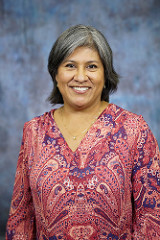Do women rely on the internet for health information?
 While there’s an abundance of helpful health resources online, a new study suggests that women, particularly those middle-aged and older, do not take full advantage of what’s there.
While there’s an abundance of helpful health resources online, a new study suggests that women, particularly those middle-aged and older, do not take full advantage of what’s there.
Carolyn Mendez-Luck, an assistant professor in the College of Public Health and Human Sciences at Oregon State University, is a co-leader of a study of 418 women age 44 and older who cope with at least one chronic health condition. She shared the findings in an interview with Voices for Affordable Health. Answers have been edited for clarity and brevity.
Voices: What questions did you have or what did you hope to discover when you started this research?
Mendez-Luck: We were interested in understanding first if middle-aged and older women used the internet to manage their chronic conditions. And, if they did, what kinds of web-related activities they engaged in. There hasn’t been a lot of research on older women’s preferences.
Voices: You found 35 percent of the women don’t use the internet at all. What does that indicate?
Mendez-Luck: We show that about two-thirds of all women reported using the internet. What are some of the barriers for the other third? Is it preference? They don’t want to? They don’t have the resources they need? Do they not have a computer? Our study doesn’t get into those explanations. It does highlight that we do need to understand it more and address the gap.
Voices: How did you define chronic conditions?
Mendez-Luck: In general, we think of chronic conditions as a disease or condition that’s persistent or has long-lasting effects. The survey asked women if they’d ever been told by a health care provider that they have a specific disease or condition. We asked about the most common ones: asthma, diabetes, arthritis, COPD (chronic obstructive pulmonary disease), high blood pressure.
Voices: Why focus on women?
Mendez-Luck: When we were thinking about this research, we thought women would especially benefit because they are more likely than men to live with chronic diseases and they’re more likely to use social networking sites than men. That’s a good place to start.
Voices: Help us understand the potential of the internet to manage chronic conditions?
Mendez-Luck: We use the internet for so many things now. Health is one of them. Research shows that greater internet engagement may help people improve their health and their health behaviors. In addition to relying on health care providers, individuals can use the internet to help cope with their chronic disease. They can, with a key stroke, get information. It’s another way that keeps them engaged and invested in their own health.
Voices: What specific resources are people using?
Mendez-Luck: We asked two different questions: if they used the internet to participate in an online discussion, chatroom, or list-serve to help support their chronic disease.
And we asked them if they ever used the internet to read about other people’s experiences. For example, whether they read blogs. And then we asked them what would they like.
What’s important for people is to find a resource that fits them. If they feel comfortable, they’re more likely to keep using that resource. If an online support group resonates with them, helps them manage their disease and feel more confident, that’s what they should keep using. But I do think it’s important that people vet that resource and make sure that the information they’re tapping into is correct and is based on research.
Voices: How do people find this kind of information? And is it free?
Mendez-Luck: I would suggest going to a local library. Seeking help from a librarian. There’s a lot of free information. A person shouldn’t have to pay to go on the internet and find information.
There are some sites a person just starting out can rely on: www.health.gov, that’s the website for the Office of Disease Prevention and Health Promotion. And the other is www.cdc.gov. That’s the Centers for Disease Control and Prevention. Those two sites, sponsored by the federal government, have information on self-care, on a variety of different diseases, on healthy living. There’s a wealth of information, evidenced-based information based on research that has been scrutinized and is reliable.
If you have a specific chronic condition, say arthritis, you can go to the Arthritis Foundation. If you have diabetes, there’s the American Diabetes Association. There are a number of national groups that do research, educate the public and advocate for awareness of the diseases. They also have a wealth of information that would be considered trustworthy.
Voices: Your study found the internet isn’t a one-size-fits-all solution. Who benefits?
Mendez-Luck: The internet has the potential to benefit all people seeking information, but health information and resources should be tailored for specific populations and conditions.
Voices: Do you think the information is already there?
Mendez-Luck: I think there’s a lot of information out there, and I think some of it is tailored for an older aging population — but you have to seek it out. … We have an opportunity to improve the way we communicate to particular audiences. But first we have to get those women who don’t use the internet to use the internet. Otherwise, it wouldn’t matter if it’s tailored to them.
Are you looking for health-information? Be sure to check out Voices’ Resources page.